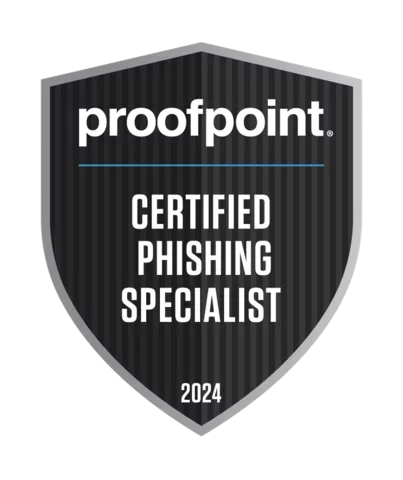
Proofpoint Certified Phishing Specialist 2024
Enrollment Closed
Winter 2024
For All Cybersecurity Levels
Certified Phishing Specialist
Latest trends & tactics in modern phishing attacks
Phishing threats continually evolve to bypass security programs and human detection, and it only takes one person to fall for phishing to incite a severe data breach. So how do you remain aware and protected in the changing phishing landscape? How do you educate your employees to recognize the warning signs and avoid revealing sensitive information?
Our Certified Phishing Specialist program is designed to train you on the latest trends and tactics used in modern phishing attacks, provide valuable insight into phishing prevention, and demonstrate how Proofpoint’s human-centric approach can help you better protect your company.
Becoming certified is easy.
Session Details
Anatomy of the Phish – Breaking Down the Latest Phishing Attacks
On-Demand
On-Demand
The migration to working from home has forced many security teams to drastically change their defensive strategies to protect end users. In response, threat actors have become more devious, more targeted, and more highly motivated to compromise your sensitive data.
Attackers are working harder than ever, using new methods and new bait to lure and hook their victims. You’ll learn from the most recent real-world examples of phishing attacks seen by Proofpoint, which utilize Microsoft office collaboration tools and OAuth permissions, TOAD (telephone-oriented attack delivery) methods, text messages, PhaaS supply chains and others. By understanding the way phishers operate, you’ll be better prepared to recognize and combat attacks when they occur in your organization.
Join us for the first course as our experts discuss:
- How phishing has evolved in the last several years
- Modern phishing techniques including BEC/EAC, advanced social engineering, and more
- Recent examples of phishing attacks seen in the wild
- Phishing trends to watch out for in the future
Built to Scale – Creating a Platform for Phishing Prevention
On-Demand
On-Demand
As you’ll learn in our first session, phishing emails come in a variety of forms and flavors, with advanced features designed to bypass even the most cutting-edge security solutions. It’s no surprise then, that phishing attacks like business email compromise are incredibly costly.
Modern threat actors have created entire platforms in hopes of completing a single successful attack. To protect your users and secure all your organization’s potential threat vectors, you need a platform of your own.
Building a layered security approach with multiple attack stop-gaps and fail-safes is especially crucial to stopping phish. Learn how phishing attacks rely on, and take advantage of various technologies employed by your end users, and how to implement more adaptive controls to reduce your overall attack exposure.
Join us for the second session to learn:
- How a phishing attack can move through your network
- Identifying phishing vulnerabilities within your security infrastructure
- Why and how to build a layered security approach against phishing
Human Firewall— Prepping Your Users to Fight Phishing
On-Demand
On-Demand
People are the primary target of cybercriminals. And it only takes one person to fall for phishing to incite significant financial loss or a severe data breach. Organizations struggle to improve users’ learning retention and detection efficacy with their current security awareness programs. To fight phishing, you need to empower users with the right knowledge and tools, so they can become a strong last line of defense.
Join us for the third and last course as our experts discuss:
- How phishing has impacted various industries
- The challenges with security awareness training
- Best practices for educating your end users
- How to measure behavior change
